
In State v. Luis A. Maisonet (A-28-19/083066) (Decided March 23, 2021), the Supreme Court of New Jersey held that defendant Luis Maisonet was not denied his constitutional right to counsel when, on the day his murder trial was set to begin, he sought an adjournment to see if he could hire a private attorney and his request was denied.
Facts of State v. Maisonet
Defendant Luis Maisonet (Defendant or Maisonet) was charged with first-degree murder and other offenses in connection with a September 2016 shooting. After learning that his ex-girlfriend and her new boyfriend, Christopher Romero, were expecting a child, defendant went to the store in the outlet mall where Romero worked, pulled out a handgun, and fatally shot Romero. Defendant then walked to the nearby store where his ex-girlfriend worked and pointed the gun at her before shooting himself in the chest area. Defendant was treated at the hospital and was arrested days later. He requested that a public defender represent him.
Trial was scheduled to start on December 4, 2017. By then, Defendant had been represented by the same assistant deputy public defender for fifteen months. Right before jury selection was to begin, Defendant asked the court for an adjournment. He stated that, although he would have stayed with his attorney “all the way to the end” if he had taken a plea, “I cannot go to trial with [appointed counsel]” because she had tried only two cases in her career, neither of which were murder trials.
The trial judge offered Defendant two choices — to hire his own attorney or to represent himself — and stated, “I don’t decide who represents you.” When Defendant interjected, the trial judge told Defendant to stop talking and stated, “I have no reason to believe that [appointed counsel] cannot represent you fairly and to the best of her ability. She is an experienced lawyer.” The judge denied the adjournment request and indicated that appointed counsel would represent defendant through trial.
Defendant then repeated his request for a postponement to “go back and call family . . . to see if they can get some money together” to hire a private lawyer. The judge noted that they were “here for trial” and that Defendant had known about the trial, his plea offer, and who his attorney was “for a long period of time.” The judge again denied the adjournment request; when Defendant pressed on, the judge asked defendant to take a seat so she could bring the jury in.
The case proceeded to trial, and the jury convicted Defendant on all counts presented. The Appellate Division affirmed Defendant’s convictions. The Court granted certification limited to this question: “whether defendant’s constitutional right to counsel of his choice was violated.”
NJ Supreme Court’s Decision in State v. Maisonet
The New Jersey Supreme Court affirmed. “Like the Appellate Division, we reject defendant’s claim,” Chief Justice Stuart Rabner wrote. “We also affirm settled principles of law that require trial judges to conduct a ‘reasoned, thoughtful analysis’ of certain factors when they consider a request for an adjournment to hire new counsel.”
In reaching its decision, the New Jersey Supreme Court emphasized that “the trial court must strike a balance between (a) its right to control its own calendar and the public’s interest in the orderly administration of justice and (b) a defendant’s constitutional right to obtain counsel of his choice.” It also noted that the court adopted a series of factors in State v. Furguson, 198 N.J. Super. 395, 402 (App. Div. 1985) that are intended to help trial judges balance the relevant interests when a defendant seeks an adjournment to retain counsel. “We reaffirm their use today and remind trial judges to analyze them when defendants request an adjournment to obtain counsel of their choice,” Chief Justice Rabner wrote.
The Chief Justice further explained that courts have broad discretion in weighing the Furguson factors. An arbitrary or erroneous ruling that amounts to an actual deprivation of the right to counsel of one’s choice implicates structural error, and prejudice is presumed. However, the New Jersey Supreme Court noted that courts can’t presume structural error from a trial court’s failure to ask questions or make explicit findings about the Furguson factors if the record otherwise reveals that an adjournment to seek to hire new counsel was not appropriate.
“If a trial judge does not conduct the proper analysis, as happened in this case, it may be necessary to reverse a conviction and start anew,” Rabner explained. “But defendants are not automatically entitled to a new trial. When a reviewing court can glean or infer the relevant considerations from the record, it may evaluate the appropriate factors, as the Appellate Division did here.”
The New Jersey Supreme Court went on to evaluate the Furguson factors on the record. While it noted the record was “thin,” it ultimately concluded that it allowed for consideration of nearly all of the factors. “Here, it is difficult to imagine a different outcome on the facts presented,” Chief Justice Rabner wrote. “When a defendant shows up on the morning of a murder trial, a year after indictment, and asks for time to call family members to see if they might provide funds for a private attorney, it can hardly be said that denying a request for an adjournment amounts to an abuse of discretion.”
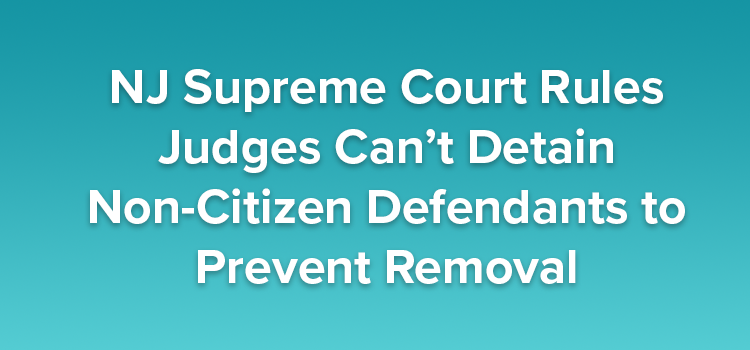
In State v. Lopez-Carrera (A-8-20/084750) and State v. Molchor; State v. Rios (A-9-20/084694) (Decided March 30, 2021), the Supreme Court of New Jersey held that the Criminal Justice Reform Act (CJRA) does not empower judges to detain defendants who are non-citizens to prevent immigration officials from removing them from the country before trial.
Facts of the Cases
Defendants Juan Molchor and Jose Rios were arrested and charged with aggravated assault and criminal mischief after allegedly punching and striking an acquaintance over the head with beer bottles at a party and damaging two cars as they left. Pretrial Services prepared Public Safety Assessments (PSAs) for both defendants. The PSAs rated both defendants 1 out of 6 for failure to appear, the lowest level of risk, and 2 out of 6 for new criminal activity. Pretrial Services recommended that both be released with monthly reporting.
The State moved for pretrial detention, claiming defendants posed a flight risk because they were undocumented immigrants. The State presented no evidence that U.S. Immigration and Customs Enforcement (ICE) was interested in either defendant. The court ordered both defendants detained pretrial, noting that, but for their immigration status, both would likely have been released. In both detention orders, the court included a single finding to justify detention: “Particular circumstances, specifically, defendant is an illegal alien.” The Appellate Division consolidated the cases and reversed.
Defendant Oscar Lopez-Carrera was charged with attempted sexual assault and criminal sexual contact in relation to an alleged attempted sexual assault of a minor. He had no prior convictions or other pending charges, and no prior failures to appear. The PSA rated him at the lowest level of risk, 1 out of 6, for both failure to appear and new criminal activity. Pretrial Services recommended that Lopez-Carrera be released on his own recognizance. Immediately upon his release, ICE officials took him into federal custody. He was indicted months later. Eight months after that, ICE informed prosecutors of the following: Lopez-Carrera was the subject of a final removal order; his immigration appeals had been denied; and he would be removed from the country to Guatemala. In his immigration appeal, Lopez-Carrera unsuccessfully sought a continuance to allow his criminal charges to be resolved.
The State promptly moved to revoke Lopez-Carrera’s pretrial release based on the change in circumstances. The trial court denied the motion, relying on the Appellate Division’s recently published decision in Molchor. The Appellate Division affirmed. The State contacted ICE and asked for permission to apply for deferred action or an administrative
stay of removal to delay Lopez-Carrera’s removal from the country. Counsel for ICE responded that the removal could not be delayed. Although Lopez-Carrera was removed from the United States to Guatemala, the New Jersey Supreme Court agreed to hear his appeal because it raises an issue of significant public importance that is likely to recur.
NJ Supreme Court’s Decision
The New Jersey Supreme Court affirmed. “We agree with the Appellate Division that the language of the Act, coupled with its history, does not authorize judges to detain defendants to thwart their possible removal by ICE,” Chief Justice Stuart Rabner wrote.
While the Court acknowledged that the CJRA does not directly answer the question, and the Legislature did not debate the issue, it found that “the language, structure, purpose, and history of the CJRA reveal the Act was designed to address a defendant’s own choice not to appear in court, not independent actions by third parties like [ICE].”
In support, the court noted that the CJRA favors release with conditions, with detention reserved for defendants who pose a significant risk of non-appearance, danger, or obstruction. It also emphasized that the language, structure, and purpose of the CJRA support the conclusion that the Legislature intended to authorize pretrial detention when there is clear and convincing evidence that individual defendants pose a serious risk of non-appearance based on their own conduct, not the acts of third parties like ICE.
While the court acknowledged that ties to another country can inform a court’s decision regarding a defendant’s risk of nonappearance, it concluded that a person’s immigration status alone cannot be dispositive. “A person’s immigration status alone cannot be dispositive,” Justice Rabner wrote. “Courts must engage in a fact-specific inquiry that looks beyond status because each person’s circumstances – citizens and non-citizens alike – are different. Non-citizens who have lived here for years, gone to school here, raised families here, and established roots in their communities may pose only a minimal risk of non-appearance.”
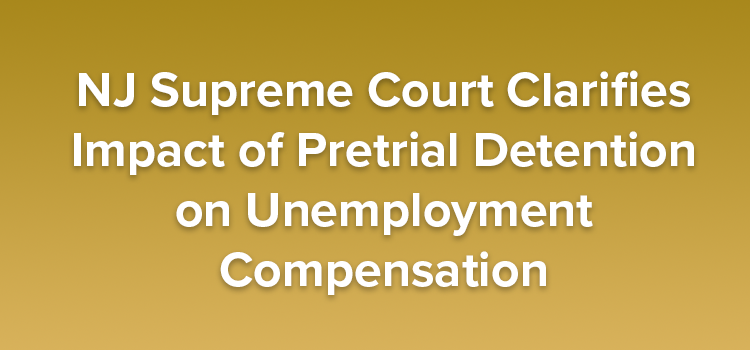
In Haley v. Board of Review (A-71-19/084123) (Decided March 17, 2021), the Supreme Court of New Jersey held that pretrial detention premised on charges that are later dismissed is not a separation from work that automatically disqualifies an applicant from unemployment benefits under the Unemployment Compensation Law (UCL). It further held that the New Jersey Department of Labor (DOL) was required to review the totality of the circumstances surrounding Plaintiff Clarence Haley’s detention and release to determine whether he “left work voluntarily,” which it failed to do.
Facts of Haley v. Board of Review
Between May and December 2017, Garden State Laboratories (Garden State) employed Clarence Haley. In December, authorities arrested Haley, charging him with a number of serious offenses. Haley was detained pretrial. One week after his arrest, Haley’s mother telephoned Garden State and requested that Haley’s position remain open while he contested the charges, but Garden State terminated Haley’s employment. Two months after his arrest, a grand jury declined to indict Haley. The prosecutor dismissed all charges and permitted Haley’s release from detention.
Haley filed an application for unemployment benefits. The Department of Labor and Workforce Development (the Department) denied the application, finding that Haley left his job voluntarily for personal reasons. Under the state’s Unemployment Compensation Law (UCL), an individual who “has left work voluntarily without good cause attributable to such work” is “disqualified for benefits” until certain conditions are met. N.J.A.C. 12:17-9.1(e) provides guidance as to what may, upon review, be deemed “voluntarily” leaving work. As relevant to the case, N.J.A.C. 12:17-9.1(e)(10) provides separation from work due to incarceration is “reviewed as a voluntarily leaving work issue.”
The Appeal Tribunal, Board of Review, and Appellate Division each affirmed. The Appellate Division, citing Fennell v. Board of Review, 297 N.J. Super. 319 (App. Div. 1997), concluded that the UCL was amended in 1961 to disqualify applicants who leave work for purely personal reasons, and that incarceration is a purely personal reason.
NJ Supreme Court’s Decision in Haley v. Board of Review
The New Jersey Supreme Court of New Jersey reversed. It held that Haley’s pretrial detention, premised on dismissed charges, was noy a “voluntarily leaving work issue” under the UCL.
“We conclude that pretrial detention is not an absolute bar to receiving unemployment compensation benefits for the time following dismissal of the charges and release from detention because N.J.A.C. 12:17-9.1(e)(10) specifically provides that ‘[i]ncarceration’ shall
be ‘reviewed as a voluntarily leaving work issue,’” the court wrote. “Based on the specific facts presented by this appeal, the UCL and N.J.A.C. 12:17-9.1(e)(10) required the Department to review the totality of the circumstances surrounding Haley’s detention and release to determine whether he ‘left work voluntarily.’”
In reaching its decision, the court emphasized “incarceration” — like the other reasons listed under N.J.A.C. 12:17-9.1(e) — is not, in and of itself, an absolute bar to unemployment benefits. Accordingly, under the court’s existing precedent and the Department’s own guidance, the Department was required to make a fact-intensive review of the totality of the circumstances surrounding Haley’s detention and release to determine whether he “left work voluntarily.”
“The fact-sensitive analysis here would have to go beyond whether Haley was ‘falsely imprisoned’ or ‘involved in a case of mistaken identity’ to consider that authorities arrested Haley, the court ordered him to be detained pretrial, the grand jury declined to indict, and the charges against him were dismissed,” the court advised. It further noted that Haley had been detained for about two months when he was released from detention and took steps to retain his job, both of which were factors that should be taken into account.
“Our decision today is guided by the notion that the UCL is remedial and the principle that N.J.A.C. 12:17-9.1(e) is not inflexible. We find that Haley’s arrest and detention were ‘not the end, but only one important part of the inquiry’ under N.J.A.C. 12:17-9.1(e)(10),” the court wrote. It then remanded the case back to the Department for proceedings consistent with its opinion.
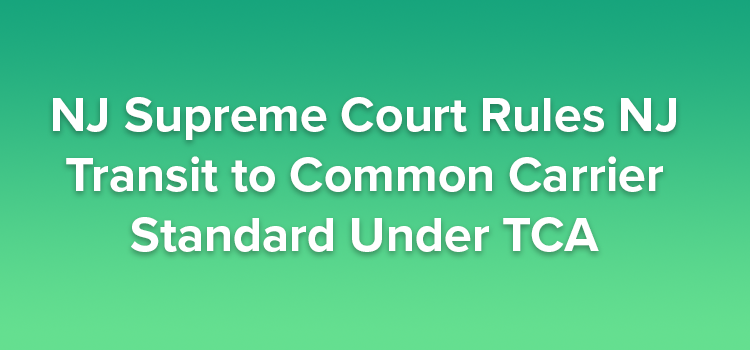
In Anasia Maison v. New Jersey Transit Corporation (A-34/35-19/083484) (Decided February 17, 2021), the Supreme Court of New Jersey held that New Jersey Transit Corporation (NJ Transit) and its bus drivers are held to the same negligence standard under the Tort Claims Act (TCA) as other common carriers, which is to exercise the utmost caution to protect their passengers as would a very careful and prudent person under similar circumstances.
Facts of Maison v. New Jersey Transit Corporation
In July 2013, Plaintiff Anasia Maison, a 20-year-old college student, boarded an NJ Transit bus operated by defendant Kelvin Coats and took a seat towards the rear of the bus. During the ride, a group of four to five teenagers verbally and physically harassed her as the bus driver silently watched and drove on. Despite the escalating threats and unruly behavior toward Maison, the bus driver did not call out the teenagers, stop the bus, or contact NJ Transit or the police. As one of the teenagers disembarked, he threw a bottle striking Maison in the forehead, causing a permanent and serious injury.
Coats testified that he knew that there was a threat to Maison. He acknowledged that his job was to get his passengers “from point A to B safely” but also stated in his deposition testimony that “it’s not my job to get involved.” After Maison was struck, he followed NJ Transit’s procedure and pushed a button to call NJ Transit’s control center. Coats waited for about fifteen minutes before the control center returned his call. The control center then contacted the police and emergency medical services. Coats admitted that he monitored the situation in the rear of the bus and that he did not stop the bus, tell the young men to “knock it off,” call the police, or contact NJ Transit’s control center until after Maison was hit with the bottle. The police never apprehended the young men who assaulted Maison.
Maison filed a complaint alleging that NJ Transit and Coats breached their common-carrier duty to protect her from the wrongful acts of co-passengers and that, as a result of their negligence, she sustained severe and permanent injuries. The trial court determined that, as a matter of law, the common-carrier standard of care applied to defendants; TCA immunities did not shield defendants from liability; and comparative fault could not be allocated to the unidentified bottle thrower. The jury returned a liability verdict against defendants and awarded Maison $1,800,000.
The Appellate Division affirmed as to the common-carrier standard and the lack of immunity, but it found that the trial court erred in not submitting to the jury the decision whether to allocate fault between the intentional tortfeasor — the bottle thrower — and defendants. It did not disturb the damages award and remanded for a new trial at which a jury would determine what percentage of fault, if any, should be allocated to the bottle thrower.
NJ Supreme Court’s Decision in Maison v. New Jersey Transit Corporation
The New Jersey Supreme Court affirmed and modified the judgment of the Appellate Division. Most notably, the court concluded that NJ Transit and its bus drivers are held to the same negligence standard under the TCA as other common carriers.
As highlighted by the New Jersey Supreme Court, the TCA directs that liability is to be imposed on public entities for the acts or omissions of their employees “in the same manner and to the same extent as . . . private individual[s] under like circumstances,” and on public employees “to the same extent as . . . private person[s].” According to the court, that directive strongly implies that similarly situated public common carriers and private common carriers are not to be treated in a different manner or to a different extent for liability purposes. In further support, the court cited that a number of other jurisdictions hold public entities to the same heightened common-carrier standard as private carriers.
The New Jersey Supreme Court also emphasized that a passenger’s expectation of safety on a bus does not vary depending on who owns the carrier. “We cannot conclude that the Legislature intended that the tens of thousands of people in New Jersey who daily rely on public transportation would not have similar protections as those who travel on vehicles owned by private carriers,” the court wrote.
The New Jersey Supreme Court next addressed whether NJ Transit and the defendant bus driver are shielded from liability by any of the three TCA immunities they invoked. It held that defendants are not shielded from liability by the TCA immunities of failure to provide police protection, N.J.S.A. 59:5-4; failure to enforce a law, N.J.S.A. 59:2-4, :3-5; and good-faith enforcement of a law, N.J.S.A. 59:3-3. According to the court, none of those immunities abrogated defendants’ common-carrier duty to protect Maison from the dangerous and threatening conduct of the teenage passengers.
Lastly, the New Jersey Supreme Court considered whether comparative fault could be allocated to the unidentified teen who threw the bottle that struck Maison in the forehead while on the bus. The court disagreed with the Appellate Division’s conclusion that the jury may decide that, because defendants’ duty of care to their passengers encompasses their duty to protect Maison from the wrongful conduct of other passengers, no allocation of fault is necessarily required. According to the New Jersey Supreme Court, the TCA leaves no doubt that an allocation of fault between a negligent public entity and its employee and an intentional tortfeasor is mandated. Nevertheless, to ensure that defendants’ duty to protect their passenger is not unfairly diluted or diminished, the trial court must give the jury clear guidance on the factors to consider in allocating degrees of fault.
The New Jersey Supreme Court remanded for a new trial on allocation of fault consistent with its opinion.

In Jed Goldfarb v. David Solimine (A-24-19/083256) (Decided February 18, 2021), the Supreme Court of New Jersey held that New Jersey’s Uniform Securities Law of 1997 does not bar an investment advisor’s promissory estoppel claim for reliance damages in connection with a rescinded job offer. While the defendant argued that the plaintiff could not file suit because the Securities Law requires investment advisers to have a writing memorializing the terms for an investment relationship, the New Jersey Supreme Court held that while the law bars suits to enforce contracts, it does not extend to suits predicated upon promissory estoppel.
Facts of Goldfarb v. Solimine
Plaintiff Jed Goldfarb claims that defendant David Solimine reneged on a promise of employment after Goldfarb quit his job to accept the promised position managing the sizeable investment portfolio of defendant’s family.
Prior to meeting defendant, Goldfarb was employed as a research analyst tasked with analyzing financial markets in order to offer investment advice. From 2009 to 2013, he earned between approximately $308,000 and $466,000 per year, exclusively from commissions. Goldfarb met defendant in March 2013. According to Goldfarb’s testimony, after several conversations, defendant offered him a job managing defendant’s family’s investment portfolio. His employment was to begin in July or August of 2013, and he would be formally employed by either defendant, defendant’s father, or one of two of the family’s companies. According to Goldfarb, defendant assured him on June 20, 2013 that he had a job. Goldfarb asked defendant for a term sheet, but defendant failed to provide any writing memorializing their agreement, and no written employment agreement was ever produced or presented to plaintiff. Nevertheless, counting on the new job that had been offered, Goldfarb quit his old one and began providing defendant with profitable stock tips and financial advice. Then, in August 2013, defendant told Goldfarb that he would not employ him. Goldfarb commenced this action in response.
Defendant argued that the agreement between the parties was governed, and barred, by the Securities Law. The trial court submitted the case to the jury on a theory of promissory estoppel. The court limited plaintiff’s potential damages, describing them as restricted “to the minimum salary he would have made” in defendant’s employ. The jury found for plaintiff on liability and awarded $237,000 in damages. The Appellate Division affirmed the verdict as to liability, but it concluded “that plaintiff was entitled to present evidence of his reliance damages” and remanded for a new trial limited to those damages.
NJ Supreme Court’s Decision in Goldfarb v. Solimine
The New Jersey Supreme Court affirmed. “We now hold that the Securities Law does not bar plaintiff’s promissory estoppel claim for reliance damages, and we affirm the liability judgment on that claim,” Justice Jaynee LaVecchia wrote. “We further affirm the remand for a new damages trial in which plaintiff will have the opportunity to prove reliance damages.”
The New Jersey Supreme Court first addressed whether a promissory estoppel claim is barred by the Securities Act in the absence of a written agreement, and, if not, whether plaintiff may obtain reliance damages. As explained by the court, the Securities Law intends to forbid the enforcement of an investment advisory contract that has not been reduced to writing. N.J.S.A. 49:3-53(a)(3) specifically prohibits any party from engaging in dishonest and unethical practices as defined by the Chief of the Bureau of Securities. The list of “[d]ishonest or unethical practices” prohibited by that statute includes “[e]ntering into, extending, or renewing any investment advisory contract, unless such contract is in writing and discloses” certain material terms. Although the writing requirement is found in a regulation, it is reinforced by statute: N.J.S.A. 49:3-71(h) declares that “[n]o person who has made or engaged in the performance of any contract in violation of any provision of this act or any rule or order hereunder . . . may base any suit on the contract.”
While the New Jersey Supreme Court agreed that the Act’s reference to forbidding suits based on “the contract” under N.J.S.A. 49:3-71(h) would translate to a suit based on the employment agreement that Solimine dishonored, it rejected the argument that the dishonored employment agreement to include the promise of employment itself. In support, the court cited the distinctions between the two forms of claims, concluding that Goldfarb’s claim of promissory estoppel is not a “suit based on the contract.” According to the court, “it is instead a suit based on his reasonable reliance, to his detriment, on Solimine’s promise of a job.”
The New Jersey Supreme Court added that no matter far-reaching the prohibitions of the Securities Law may be, they do not prohibit the current suit and its goal of deterring persons from reneging on promises. Accordingly, it found that there was no error in allowing plaintiff’s promissory estoppel claim to have been presented to the jury. According to the New Jersey Supreme Court, where the trial court did err was in mis-matching the permissible cause of action — promissory estoppel — with the impermissible remedy — expectation damages — that would have accompanied a contract-based claim.
Accordingly, the New Jersey Supreme Court remanded the case to the lower court for a new damages trial in which plaintiff will have the opportunity to prove reliance damages. As directed by the court, Goldfarb is not entitled to benefit-of-the-bargain damages
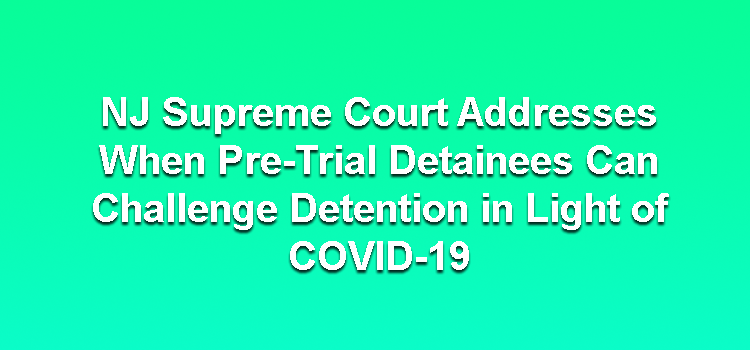
The Supreme Court of New Jersey recently addressedthe impact of the COVID-19 pandemic and the suspension of in-person criminal jury trials on defendants who have been detained pretrial. In the Matter of the Request to Release Certain Pretrial Detainees (M-550-20/085186) (Decided February 11, 2021), the court declined to grant categorical relief to broad categories of criminal defendants. However, it did hold that defendants who have been detained for at least six months may seek to reopen their detention hearings under N.J.S.A. 2A:162-19(f).
Facts of In the Matter of the Request to Release Certain Pretrial Detainees
Under the Criminal Justice Reform Act (CJRA or Act), defendants who pose a serious risk of non-appearance, danger, or obstruction can be detained before trial if no combination of conditions of release will reasonably guard against those risks. Due to COVID-19, very few criminal jury trials have been held since March 2020, and the length of pretrial detention has been extended in many cases.
In response to the situation, the Office of the Public Defender and the American Civil Liberties Union of New Jersey (ACLU) filed suit, seeking two forms of relief: (1) the release of all defendants detained for six months or longer whose most serious charge is a second-degree offense or lower, with an opportunity for the State to object in individual cases and seek to justify continued detention under an enhanced burden of proof; and (2) new detention hearings under N.J.S.A. 2A:162-19(f) for all defendants detained for six months or longer who are charged with a first-degree offense and entitled to a presumption of release.
NJ Supreme Court’s Decision in In the Matter of the Request to Release Certain Pretrial Detainees
The New Jersey Supreme Court held thatSection 19(f) of the CJRA, under which individual defendants can apply to reopen detention hearings if they can present information that was not known at the time of the initial hearing and that “has a material bearing” on the release decision, offers a path for potential relief under the present circumstances. “We hold that the unexpected duration of the pandemic coupled with the continued suspension of jury trials, with no clear end date for either, constitutes new information within the meaning of the statute,” Chief Justice Stuart Rabner wrote on behalf of the unanimous court.
The New Jersey Supreme Court further held that “materiality presents a separate issue” and depends on a defendant’s individual circumstances. To assess whether delays caused by the pandemic are material to the level of risk a defendant poses, trial judges can consider the following factors: (1) the length of detention to date as well as the projected length of ongoing detention; (2) whether a defendant has been or will be in detention longer than the likely amount of time the person would actually spend in jail if convicted; (3) the existence and nature of a plea offer; (4) a defendant’s particularized health risks, if any, and whether they present a heightened risk the individual will contract COVID-19; and (5) other factors relevant to pretrial detention that are outlined in N.J.S.A. 2A:162-20.
“Defendants who have been detained for at least six months, and can make a preliminary showing that they are entitled to relief based on one or more of the above factors, have the right to reopen their detention hearings under section 19(f),” Chief Justice Rabner explained.
In reaching its decision, the court declined to grant relief on a categorical basis. “The fact-specific inquiry called for is best conducted on an individual basis in order to balance the relevant factors and assess the level of risk each defendant presents,” Chief Justice Rabner wrote. “By contrast, broad-based relief for large categories of defendants could sweep in cases in which release from detention would not be appropriate.”
Under the court’s ruling, trial judges have discretion to resolve motions that do not meet both conditions without holding a hearing. The New Jersey Supreme Court further directed that hearings should be conducted on an expedited basis in the trial court, and reviewed in the same manner on appeal. It further advised that defendants subject to a presumption of detention — those charged with murder or facing a sentence of life imprisonment — will likely not be eligible for new hearings.
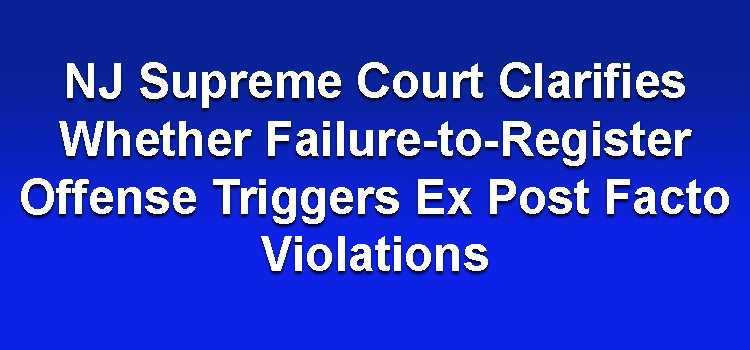
The Supreme Court of New Jersey recently clarified whether state or federal constitutional ex post facto prohibitions permit defendants to be convicted of failure to comply with sex offender registration requirements when each defendant’s registration requirement arose from a conviction that occurred before the penalty for noncompliance was raised a degree. In State v. Hakum Brown and State v. Rodney Brown (A-39-19/083353) (Decided January 25, 2021), the court held that the New Jersey Legislature can increase the penalty for the offense of failure to comply with the regulatory registration requirement — which is separate and apart from defendants’ predicate sex offenses —without violating ex post facto principles as to those predicate offenses.
Facts of State v. Hakum Brown; State v. Rodney Brown
New Jersey’s law governing the sex offender registration and notification system, N.J.S.A. 2C:7-1 to -23 or more commonly known as Megan’s Law, imposes a registration requirement on convicted sex offenders. In its original form, Megan’s Law made failure to register chargeable as a fourth-degree offense. The statutory scheme has been amended several times, including a 2007 amendment through which the New Jersey Legislature prospectively elevated failure to register to a third-degree offense.
In 1995, Rodney Brown (R.B.) was convicted of sexual assault. In 2000, Hakum Brown (H.B.) was convicted of sexual assault and endangering the welfare of a child. As a result of those predicate convictions, H.B. and R.B. were subject to the sex offender registration requirements imposed by Megan’s Law. At the time of H.B.’s and R.B.’s sex-offender convictions, failure to comply with the registration requirements was punishable as a fourth-degree offense. However, in 2007, the Legislature upgraded failure to register to a third-degree offense. In 2014, H.B. failed to timely register with his local police department. R.B. similarly failed to register in 2015. Each was charged with third-degree failure to register.
H.B. pleaded guilty but appealed, asserting there is an ex post facto violation in being charged with third-degree failure to register when, at the time of his predicate sex- offender conviction, failure to register was only a fourth-degree offense. R.B. pleaded not guilty. He moved to dismiss his indictments on ex post facto grounds, and the trial court granted R.B.’s motion in its entirety. The State appealed the dismissal of R.B.’s indictments. The Appellate Division consolidated the State’s appeal in R.B.’s matter with H.B.’s appeal from his conviction. Relying on State v. Timmendequas, 460 N.J. Super. 346 (App. Div. 2019), the Appellate Division reversed H.B.’s conviction and affirmed the dismissal of R.B.’s indictment.
NJ Supreme Court’s Decision in State v. Hakum Brown; State v. Rodney Brown
The New Jersey Supreme Court reversed. It held that the defendants suffered no ex post facto violation as a result of being charged with failure-to-register offenses bearing the increased degree.
“We hold that defendants suffered no ex post facto violation as a result of being charged with failure-to-register offenses bearing the increased degree. Defendants committed the charged offenses after the effective date of the 2007 amendments, of which each had fair notice,” Justice Jaynee LaVecchia wrote. “This Court has consistently regarded the Megan’s Law registration requirement as a legislatively imposed regulatory consequence of committing a sex offense, as defined under Megan’s Law, even though the Legislature has chosen to enforce that administrative scheme with punitive consequences.”
As the court explained, two findings must be made for a law to violate the constitutional prohibition on ex post facto laws. The court must determine: 1. whether the law is retrospective, meaning it applies to events occurring before its enactment or changes the legal consequences of acts completed before its effective date; 2. whether the law, as retrospectively applied, imposes additional punishment to an already completed crime.
In reaching its decision, the New Jersey Supreme Court emphasized that it previously held in Doe v. Poritz, 142 N.J. 1 (1995),that the Megan’s Law registration requirement is regulatory and remedial rather than punitive and therefore held that Megan’s Law’s retroactive application to persons who had already been convicted of eligible sex offenses did not subject past offenders to additional punishment and did not offend the Ex Post Facto Clauses. As the court further explained, registration is retroactive but not punitive. Prosecution for failing to register, however, is different in that it addresses a separate crime and is punitive but not retroactive. Based on the foregoing, the New Jersey Supreme Court further held that “the Legislature is free to increase the penalty for the offense of failure to comply with the regulatory registration requirement — which is separate and apart from defendants’ predicate sex offenses — without violating ex post facto principles as to those predicate offenses.”
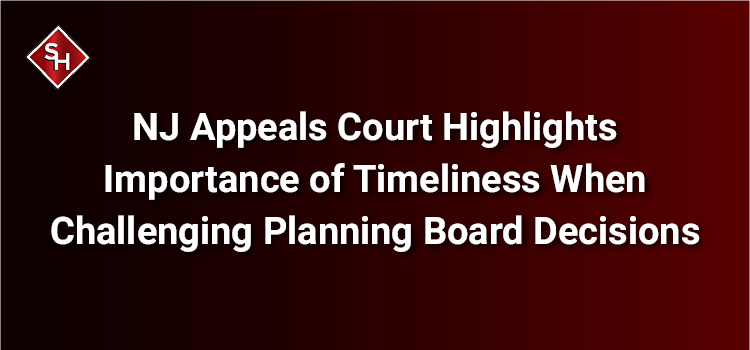
In Hassan v. Borough of Emerson, the Appellate Division of the New Jersey Superior Court held that a plaintiff’s complaint in lieu of prerogative writs challenging a resolution granting site approval for a redevelopment project was time-barred because it was not filed within the required 45-day period. The court’s decision serves as an important reminder that time is of the essence when seeking to challenge a planning board decision.
Timeline for Actions in Lieu of Prerogative Writs Under Rule 4:69-6
Rule 4:69-6 governs the time period for filing of a complaint in lieu of prerogative writs. Rule 4:69-6 (a) provides that actions in lieu of prerogative writs must be filed within 45 days after the accrual of the right to the review, hearing, or relief claimed.
Nevertheless, Rule 4:69-6(c) allows for an enlargement of that period “where it is manifest that the interest of justice so requires.” The New Jersey Supreme Court has identified three categories that qualify under this exception: (1) important and novel constitutional questions; (2) informal or ex parte determinations of legal questions by administrative officials; and (3) important public rather than private interests which require adjudication or clarification.
Facts of Hassan v. Borough of Emerson
On September 7, 2004, the Borough of Emerson (the Borough) accepted the findings of its Planning Board and adopted a resolution that designated certain properties in Emerson as being “an area in need of redevelopment,” pursuant to the Local Redevelopment and Housing Law (LRHL). On June 27, 2016, the Borough entered into a redevelopment agreement for the Project with Emerson Redevelopers. On December 23, 2016, the Borough published a notice of the Borough council’s ordinances adopted on various dates in 2006, 2010, and 2016, which approved a redevelopment plan to supersede the existing zoning for the designated properties. On January 17, 2017, the Borough adopted a resolution confirming that the designated properties continued “to qualify as an ‘area in need of redevelopment.'” On November 28, 2017, the Borough and the Fair Share Housing Center entered into a settlement agreement in the declaratory judgment action regarding the Borough’s Mount Laurel obligations.
Following a hearing on December 10, 2018, the Board approved a site plan application for the Project submitted by Emerson Redevelopers Urban Renewal, LLC (Emerson Redevelopers). On December 28, 2018, the Board adopted a twenty-five-page resolution memorializing its site plan approval. On January 4, 2019, the Board published in The Record a notice of the adoption of the resolution. In the declaratory judgment action filed by the Borough, on January 25, 2019, the court awarded the Borough a conditional judgment of compliance and repose.
On March 27, 2019, Plaintiff, a former tenant of a property included in a redevelopment project (the Project) in the Borough filed a complaint in lieu of prerogative writs against the Borough, after the Borough Land Use Board (the Board) adopted a resolution on December 28, 2018, granting site plan approval for the Project to Emerson Redevelopers Urban Renewal, LLC (Emerson Redevelopers). Plaintiff alleged the Board’s approval of the Project “was a misuse” of the LRHL, and “nothing more than an egregious act of profiteering of developers[.]” Plaintiff did not include the Board or Emerson Redevelopers as parties. However, Emerson Redevelopers obtained a copy of plaintiff’s complaint and subsequently filed a motion to join the action as an “indispensable party,” and to dismiss the complaint.
The trial court granted the motion filed by Emerson Redevelopers to join the matter as an indispensable party and to dismiss plaintiff’s complaint with prejudice. In its subsequent opinion, the trial court noted that plaintiff “[e]ssentially . . . protests the Borough’s adoption of a redevelopment plan for the Central Business District[.]” The court held that the forty-five-day period for plaintiff to file a complaint ended on February 20, 2019, yet plaintiff did not file his action until March 27, 2019. The court found it significant “that the Borough’s designation of the property as an area in need of redevelopment occurred more than fourteen (14) years prior to the filing of the complaint.” Finding no compelling reason to extend the time for plaintiff to bring his claims, the court dismissed his complaint as time barred.
Appellate Division’s Decision in Hassan v. Borough of Emerson
The Appellate Division affirmed. The appeals court agreed that the Plaintiff’s claim did not fall within any of the exceptions under Rule 4:69-6(c). As the court explained in its opinion:
Plaintiff’s opposition to Emerson Redevelopers’ motion contained no explanation for his failure to file his complaint within forty-five days of the challenged action, nor did he identify any important public interests which require adjudication or clarification. Moreover, while plaintiff’s complaint states he “seeks relief” from the Board’s resolution granting site plan approval for the Project, a cursory review of his complaint reveals he really seeks to challenge the Borough’s designation of the properties included in the Project as an area in need of redevelopment under the LRHL. As the trial court noted, the redevelopment area designation in this case first occurred more than fourteen years before plaintiff filed his complaint.
The Appellate Division further noted that the Borough has relied upon the challenged Project to achieve Mount Laurel compliance. “Under these circumstances, we are satisfied the trial court did not abuse its discretion by declining to enlarge the time provided in Rule 4:69-6(a),” the court wrote.
For more information about the court’s decision or the legal issues involved, we encourage you to contact a member of Scarinci Hollenbeck’s Government Law Group at 201-896-4100.
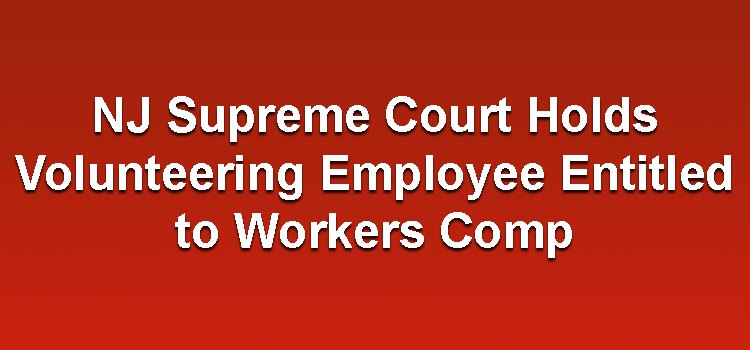
In Goulding v. NJ Friendship House, Inc., (A-48-19/083726) (Decided February 8, 2021), the Supreme Court of New Jersey held that an employee volunteering at an employer-sponsored event was entitled to compensation for her injuries under the state’s Worker’s compensation Act. According to the unanimous court, plaintiff Kim Goulding’s role at the event, serving as a cook, was the same as her role as an employee, and but for her employment at NJ Friendship House, Inc., Goulding would not have been asked to volunteer and would not have been injured.
Facts of Goulding v. NJ Friendship House, Inc.
Kim Goulding was an employee of North Jersey Friendship House, Inc. (Friendship House), a non-profit organization that assists individuals with developmental disabilities. She worked Monday through Friday as a chef/cook, and her responsibilities included cooking meals for, and teaching vocational classes to, Friendship House’s clients.
On a Saturday in September 2017, Friendship House hosted its first ever “Family Fun Day,” which it planned to hold as an annual event moving forward. The event was designed to provide a safe and fun environment with recreational activities for the clients of Friendship House and their families. Friendship House employees were asked to volunteer to work the event, but there were no consequences for those who did not. Goulding volunteered to work the event as a cook, her normal job at Friendship House.
On the day of the event, Goulding set up breakfast. While later preparing for lunch, she stepped in a pothole and fell down, injuring her ankle. Goulding continued to help the other cooks prepare lunch while keeping her foot iced and elevated. She left in the afternoon and did not participate in any of the games or activities at the event.
Goulding filed a claim for worker’s compensation and benefits. Friendship House maintained that Goulding was not entitled to relief because she was not working for Friendship House when the injury occurred. Under New Jersey’s Worker’s Compensation Act, an employee injured during a social or recreational activity generally cannot receive compensation for those injuries. However, the Act provides an exception to that general rule and expressly permits compensation “when such recreational or social activities [(1)] are a regular incident of employment and [(2)] produce a benefit to the employer beyond improvement in employee health and morale.”
The workers’ compensation court dismissed Goulding’s claim, determining that Family Fun Day was a social or recreational event and that the two-part test of N.J.S.A. 34:15-7 was not satisfied. The Appellate Division affirmed.
NJ Supreme Court Decision in Goulding v. NJ Friendship House, Inc.
The New Jersey Supreme Court unanimously reversed. It held that the injury Goulding sustained while volunteering at her employer-sponsored event is compensable because, as to Goulding, the event was not a social or recreational activity. The court further held that even if N.J.S.A. 34:15-7 was applicable, Goulding would still have satisfied the two-part exception set forth in that statute. As Justice Fernandez-Vina explained, Goulding’s role at the event, which was planned to be held annually, was the same as her role as an employee, and but for her employment at Friendship House, Goulding would not have been asked to volunteer and would not have been injured. Accordingly, Goulding’s injury was “a regular incident of employment.”
New Jersey Supreme Court first addressed whether Goulding’s volunteering at Family Fun Day was a social or recreational activity. According to the court, if an employer-sponsored event is designed with the purpose of benefitting the employer’s clients, and an employee volunteers to help facilitate the event, the event can’t be deemed a social or recreational activity as to that employee. Justice Fernandez-Vina wrote:
Whether an activity is social or recreational should turn on the employee’s role in the activity — whether she is participating as a guest or providing services for her employer at the event. If the employee is helping to facilitate the activity in the manner that occurred here, the event cannot be deemed a social or recreational activity as to that employee, and any injuries sustained by the employee while acting in that capacity should be compensated. That result accords with the liberal construction due the Act as “humane social legislation.”
The New Jersey Supreme Court also disagreed with the Appellate Division’s conclusion that Goulding failed to satisfy the two-prong exception established in N.J.S.A. 34:15-7. “Her role at the event, which was planned to be held annually, was the same as her role as an employee; but for her employment at Friendship House, she would not have been asked to volunteer and would not have been injured,” Justice Fernandez-Vina wrote. “Viewed in that light, Goulding’s injury was ‘a regular incident of employment.’”
In further support of the court’s decision, Justice Fernandez-Vina noted that Friendship House received a benefit from Family Fun Day beyond an improvement to employee health and morale. The event was not a closed, internal event for the Friendship House team. Rather, it was an outreach event designed to celebrate and benefit Friendship House’s clients, thereby creating goodwill for Friendship House in the community that could expand its fundraising opportunities in the future.
Because the court found that Goulding’s injuries were compensable, it remanded the matter to the worker’s compensation court for further proceedings.
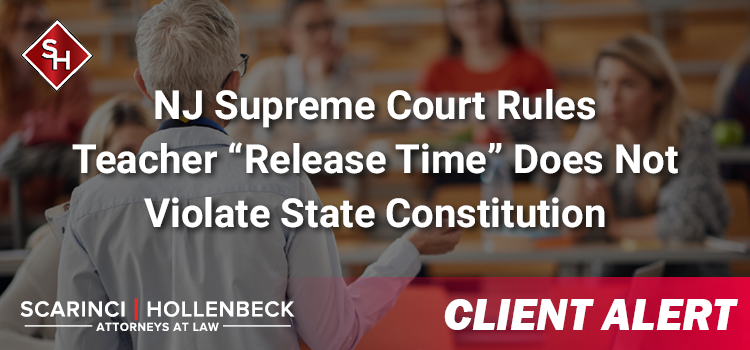
In Rozenblit v. Lyles, the New Jersey Supreme Court issued a significant decision rejecting statutory and constitutional challenges to provisions in a collective negotiations agreement [CNA] between the Jersey City School District [District] and the Jersey City Education Association [Association] that authorized two teachers [“releasees”], employed and paid by the District, to work full-time on the Association’s business, a practice described as “release time.”
Facts of Rozenblit v. Lyles
On May 10, 2010, the District and the Association executed the CNA, which was effective from September 1, 2013 to August 31, 2017. The suit centers on Article 7 of the CNA, which addresses “Association Rights.” Section 7-2.3 stated that “[t]he president of the [Association], and his/her designee, shall be permitted to devote all of his/her time to the Association business and affairs. The [p]resident shall continue to be granted adequate office and parking facilities.” Meanwhile, Section 7-2.4 stated that “[t]he president’s designee shall carry out appropriate Association business, provided that the aforesaid business shall not disrupt the educational process. The designee shall notify the Superintendent or his/her designee as to where and when he/she is carrying out such Association business during school time.”
The two employees designated as releasees pursuant to the above Sections were the Association’s president, Ronald Greco, and its second vice president and Grievance Chair, Tina Thorp. Both received full-time salaries and benefits from the District. According to court documents, the releasees’ duties include facilitating labor-management relations, resolving disagreements, promoting effective communications between teachers and administration, promoting harmonious employer/employee relationships, and helping set and clarify school policies with the administration. The releasees keep an appropriate Associate Superintendent apprised of the work they are doing and their location. Mr. Greco also stated that he is regularly asked by central administrative staff to visit a school to conciliate a dispute and report back.
Plaintiffs Moshe Rozenblit and Won Kyu Rim sought a declaratory judgment holding that the District’s payment of the salaries and benefits of employees on release time is contrary to the Gift Clause provisions of Article VIII, Section 2, Paragraph 1; Article VIII, Section 3, Paragraph 2; and Article VIII, Section 3, Paragraph 3 of the New Jersey Constitution.
Plaintiffs and the Association both sought summary judgment. The trial court sided with the Association, holding that the disputed provisions did not violate the Gift Clause. The Appellate Division reversed, concluding that the Jersey City Board of Education [Board] acted beyond the scope of its statutory authority when it paid the salaries and benefits of the two releasees. It specifically held that N.J.S.A. 18A:30-7, the statute on which the Jersey City Board of Education [Board], the District, and the Association relied as authority for their agreement to the release time provisions, did not permit the Board to disburse public funds to the releasees. The Appellate Division did not reach the constitutional issues raised by the plaintiffs.
NJ Supreme Court Decision in Rozenblit v. Lyles
The New Jersey Supreme Court reversed. The Court held that the CNA’s release time provisions were authorized by the plain language of N.J.S.A. 18A:30-7, construed in conjunction with two related provisions of the Education Code, N.J.S.A. 18A:27-4 and N.J.S.A. 18A:11- 1(c), and with a core provision of the Employer-Employee Relations Act [EERA]. The court further held that release time served the public purpose of facilitating the collective bargaining process and allowing the district and the union to more easily resolve labor disputes. Accordingly, the New Jersey Supreme Court held that release time did not constitute a gift from the district to the union in violation of the New Jersey Constitution.
The New Jersey Supreme Court first addressed whether the Legislature granted the Board the authority to pay the salaries and benefits of the two releasees. It ultimately concluded that the Board’s payment of salaries and benefits to the releasees is within its statutory grant of authority. As Justice Anne Patterson explained:
We do not share the Appellate Division’s view that the Board’s agreement to the disputed provisions exceeded its statutory grant of authority. In the Education Code, the Legislature empowered boards of education to make rules governing the compensation of teachers, N.J.S.A. 18A:27-4, and to fix “the payment of salary in cases of absence not constituting sick leave,” N.J.S.A. 18A:30-7. The Legislature thus authorized the Board to grant a paid leave to the releasees to allow them to attend to labor relations work pursuant to the CNA. Moreover, because the releasees’ efforts encourage cooperative labor relations and facilitate the early resolution of employer-employee disputes, the CNA’s release time provisions facilitate the Board’s management of the public schools pursuant to N.J.S.A. 18A:11-1(c). The releasees also further the mediation and resolution of labor disputes in accordance with N.J.S.A. 34:13A-2, a provision of the Employer-Employee Relations Act (EERA).
The New Jersey Supreme Court next turned to the constitutional challenge. It agreed with the trial court that the Board did not violate the Gift Clause of the New Jersey Constitution when it agreed to the release time provisions in the CNA.
As the court explained, under the standard set forth in Roe v. Kervick, 42 N.J. 191, 218-19 (1964), a court addressing a Gift Clause challenge must first determine whether the transaction is for a public purpose, and second, whether the means to accomplish that public purpose are consonant with it. For purposes of the first inquiry, courts consider whether the disputed activity serves as a benefit to the community as a whole and is directly related to the functions of government. The second inquiry requires the resolution of two subsidiary questions: (1) whether the transaction is contractual and involves some obligation on the part of the private entity that is intimately tied to fulfilling the public purpose, and (2) whether the accomplishment of the public purpose is the paramount factor in the contract with any private advantage being merely incidental or subordinate.
The Court emphasized that the releasee’s “primary assignment” is to engage with District and Associate personnel to resolve labor disputes, the releasees are regularly asked by school officials to intervene, and they report back to the District on “results achieved.”
“Applying the standard prescribed in Roe v. Kervick, 42 N.J. 191, 218-19 (1964), and later case law, we conclude that the release time provisions serve a public purpose and are so consonant with the accomplishment of that public purpose that they do not offend the Gift Clause,” Justice Patterson wrote. Based on its findings, the New Jersey Supreme Court reversed the judgment of the Appellate Division and reinstated the trial court’s order dismissing plaintiffs’ claims.
The Supreme Court’s decision has resolved an important issue in the area regarding labor and management relations.
For more information about the court’s decision or the legal issues involved, we encourage you to contact a member of Scarinci Hollenbeck’s Government Law Group.
